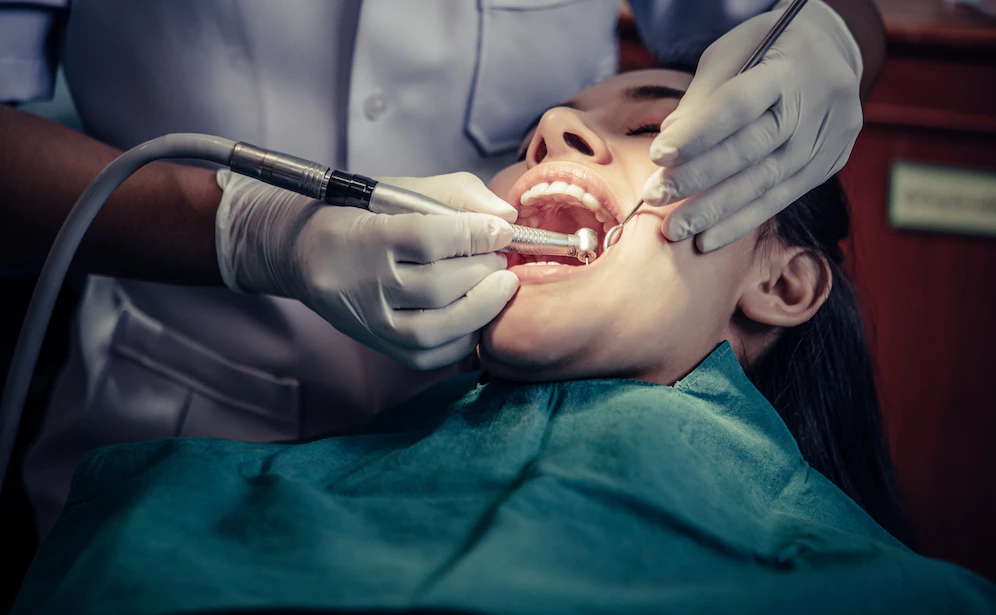Toothaches can be incredibly uncomfortable and disruptive, making even the simplest tasks like eating or talking unbearable. They are often a sign of an underlying dental problem that requires attention and treatment.
In this blog post, we’ll explore common dental issues that can cause toothaches, helping you understand the culprits behind dental discomfort and the importance of seeking timely dental care.
The Dental Problems That Results In The Toothaches
Dental problems are something that we do not offer much value. But they offer pain and suffering. Here we provide you with a list of dental problems that result in Toothache.
Dental Cavities
Have you ever experienced a sharp, persistent pain in your tooth? It’s possible that you have a cavity. Dental cavities are a common affliction caused by the erosion of the tooth’s protective enamel by bacteria in the mouth. As the decay progresses, it exposes the sensitive inner layers of the tooth, leading to pain and sensitivity.
If left untreated, cavities can become more severe and cause potential infections. Don’t ignore that persistent toothache – book a visit with your dentist and prevent further damage to your teeth.
Gum Disease

Gum disease, or periodontal disease, is a major dental problem affecting countless people worldwide. It typically begins with gingivitis, which is characterized by inflamed, red gums that may bleed during brushing or flossing.
If left untreated, the disease can advance to periodontitis, wherein the gums recede and form pockets around the teeth.
These pockets trap bacteria that may lead to bone loss, tooth mobility, and toothaches. Periodontal disease not only affects your oral health but also your overall well-being. Therefore, taking proper care of your teeth and gums is crucial to prevent gum disease from taking hold and causing serious complications.
Dental Abscess
A dental abscess is a pocket of pus caused by a bacterial infection near the tooth root or between the gums and the tooth. It is often a result of untreated cavities, gum disease, or dental trauma.
The abscess causes severe toothache, throbbing pain, facial swelling, and even fever. An untreated dental abscess can lead to serious complications and require immediate dental intervention.
Tooth Fracture
A cracked or fractured tooth can be another source of toothache. Tooth fractures may result from trauma, grinding, or biting on hard objects. The pain can vary, depending on the extent of the fracture and its location.
Some fractures may be difficult to detect without a dental examination, making regular dental check-ups crucial for early detection and treatment.
Bruxism
Bruxism, or teeth grinding, is a common condition that can wear down tooth enamel over time. This can lead to tooth sensitivity and pain, particularly when consuming hot or cold foods.
Bruxism often occurs during sleep, making many people unaware of the problem until dental issues and toothaches arise.
Dental Erosion

Acidic foods and beverages, as well as certain medical conditions like acid reflux, can lead to dental erosion. The acid softens the enamel, making it more susceptible to wear and sensitivity. Gradually, dental erosion can cause toothaches, especially when consuming hot, cold, or sweet foods.
Impacted Wisdom Teeth
Wisdom teeth, or third molars, are the last set of teeth to emerge, typically in late adolescence or early adulthood. Due to lack of space, these teeth often become impacted, causing pain and pressure on neighboring teeth.
Impacted wisdom teeth can lead to infections and inflammation, resulting in toothaches and discomfort.
Dental Fillings Or Restorations
While dental fillings and restorations are meant to address dental issues, they can sometimes lead to toothaches if complications arise. Over time, fillings may become loose or damaged, exposing the tooth to bacteria and causing sensitivity or pain.
Proper dental care and regular check-ups are essential to ensure the longevity and effectiveness of dental restorations.
Dental Care Practices
Dental care is a problem that haunts people irrespective of age. Yes, it’s a serious problem that greatly torments an individual. There is no alternative to dental care best practices. Here we discuss some of the practices that can save you from spending money on dental care and, at the same time, suffer badly.
First, floss your teeth atleast once a day after bruising. Flossing between the teeth and gum stops the accumulation of the sediment that causes you problems. It is one of the most effective ways to care for your teeth.
Brush your teeth twice a day with the help of a toothbrush that has soft bristles. Do it gently to stop it from hurting your gums or the sides of your mouth. These areas are soft and sensitive, to say the least.
Replace your toothbrush every three to four months or as soon as needed. A worn-out toothbrush will not offer you the cleanliness that you are expecting.
Be mindful of selecting toothpaste. Use fluoride toothpaste. It can help you strengthen the enamel of your tooth.
Home Remedies For Toothache
Painkillers and other medications to get rid of toothache have their benefits. But alongside it, they have their own side effects. Therefore we discuss some of the most effective home-based treatment options for you so that you can easily use them to get instant relief from your problem.
They include Garlic, clove, Guava leaves, peppermint tea back, hydrogen peroxide rinse, and others. The efficacy of these medications is based on the observations. However, some of these home remedies are backed by scientific observation, research, and ratifications.
Conclusion
Toothaches are more than just temporary discomfort; they are warning signs of underlying dental problems that require your attention. Ignoring them can lead to severe pain, worsening conditions, and potential dental emergencies. That is why regular dental check-ups are crucial for early detection and treatment of dental issues, helping to prevent toothaches and maintain excellent oral health.
Don’t forget to practice good oral hygiene, eat a balanced diet, and seek prompt dental care whenever you experience tooth pain or discomfort. And remember, in case of a dental emergency, always have the contact information of an emergency dentist on hand.
Also, take note of the dental care practices and the home remedies to keep the toothache at bay. Long-term dental care frees you from the troubles you face with toothaches. Your smile deserves nothing but the best care, so prioritize your dental health and stay on top of your oral care routine.
Read Also:
















